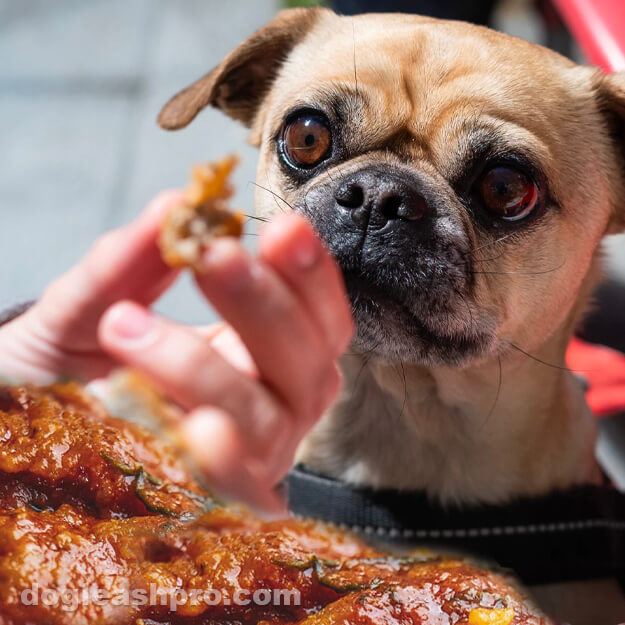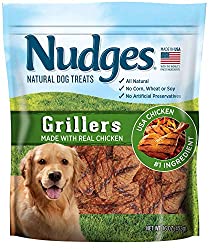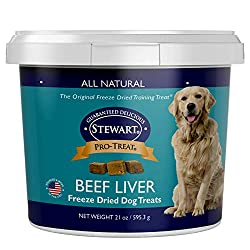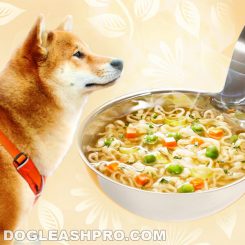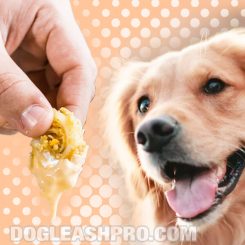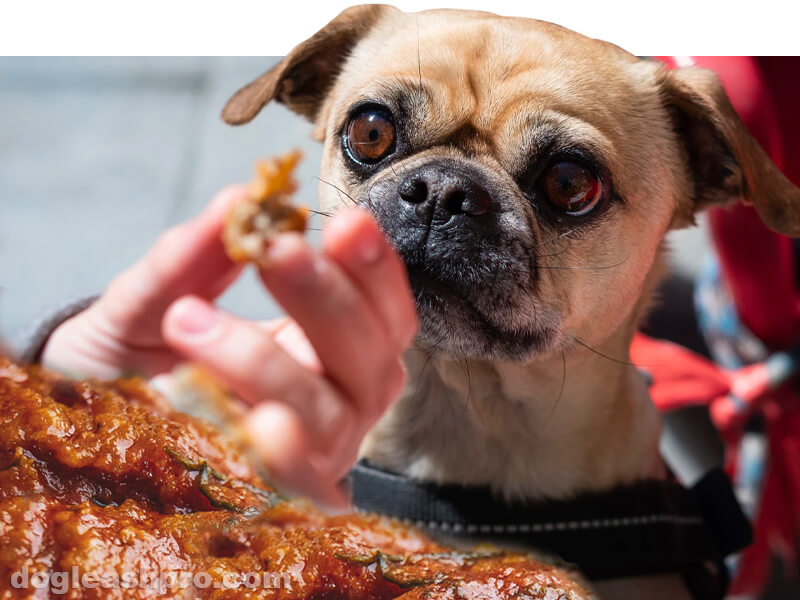
Every sunday, I head over to my favorite grocery store to pick up a freshly made rotisserie chicken. As soon as I bring it home, the delicious smell fills up the kitchen. Before I know it, my two dogs are following me around trying to get a bite of it. Last weekend, I was in a rush and accidentally gave them the Chicken skin that was on the meat and began to wonder if doing so was ok.
Can dogs eat Chicken skin? No, dogs should not eat Chicken skin. Chicken skin is high in both fat and calories and does not provide any nutritional benefits to dogs. Eating Chicken skin regularly can cause weight gain, diarrhea, digestive upset, or even pancreatitis in dogs.
Before you give food with high-fat content to your pooch, think twice about how it would affect their overall health. Below, we explain Chicken skin is bad for dogs and what to feed your pooch instead.
Table of Contents
Is Chicken skin good for dogs?

No, Chicken skin is not good for dogs. Chicken skin is high in fats with no nutrients in it.
My childhood friend has both a large dog and a small dog. She thought it was fine to give her larger Labrador dog, Scout, some cooked Chicken skin. She wrongfully assumed that Chicken skin was safer for her larger dog to eat.
Two months after feeding Scout the cooked Chicken skin on a regular basis, my friend noticed that Scout was packing on the pound. Not to mention, Scout was also experiencing gastrointestinal problems such as constipation and excessive gas. There was also some blood in his stool.
My friend became worried and decided to call her dog’s veterinarian for help. The vet asked her to bring Scout in for a physical checkup. My friend freaked out and asked me to join her during this vet visit.
At the vet’s office, my friend wanted to know if it was alright to feed Scout cooked Chicken skin. She explained to her vet that she thought it would be fine to allow a larger dog to have some bite of it. Her vet’s response surprised both of us.
Here was how the conversation went:
Vet: “You should avoid feeding Chicken skin to your dogs. It doesn’t matter what size dogs you have, they all have small digestive tracts. This means that both large and small dogs have small digestive tracts.”
Friend: “I thought since Scout is a larger dog breed that it may be fine to feed him some Chicken skin. So it really doesn’t matter what size my dog is when it comes to eating Chicken skin?”
Vet: “No and actually Chicken skin is full of fat and calories. Even a small piece of it can cause diarrhea or even vomiting. That is why Scout is having gastrointestinal problems. Let me perform a full checkup.”
My friend and I waited outside for almost an hour. When the vet waved us in, she looked like she was about to deliver some bad news.
Vet: “Don’t panic, but I do have to deliver some serious news. I’m sorry to tell you both this, but Scout has acute pancreatitis.”
Me: “Oh no! Poor Scout!”
Friend: “Is there anything I can do that will help?”
Vet: “Good news is that Scout is only one year of age so it will go away with a continuous proper nutritious diet going forward. So I’d recommend that you no longer feed Scout any more Chicken skin. Chicken skin is generally harmful to dogs as it could also be a choking hazard.”
My friend and I were both relieved. It was a good thing that she noticed the symptoms right away and visited the vet before it was too late. So here is what we learned:
- Regularly eating fatty food can be risky for older dogs.
- Doing so can lead to health issues and they will creep up sooner or later.
- If your pooch has an existing weight issue, do not feed them any food with high-fat content.
My friend no longer feeds her pup any more Chicken skin.
Is Chicken skin bad for dogs?
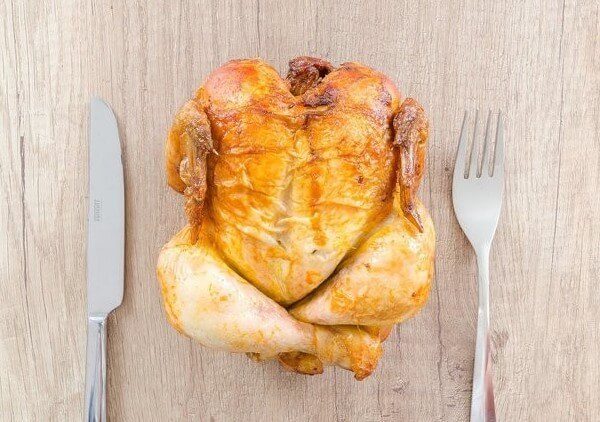
As you can see from our interaction with our vet, Chicken skin is bad for dogs due to its high fat content and serves no nutrient benefits for your dog. Additionally, eating Chicken skin on a regular basis can cause pancreatic inflammation disorder and gastrointestinal issues in canines.
It is important to note that an occasional bite of the Chicken skin is fine. Please avoid feeding it to your pup on a regular basis.
If you do give your furry friends the Chicken skin, here’s what you can do:
- Make sure to cut the Chicken skin into smaller pieces so it’s easy to chew and swallow.
- Wipe off any excess oil, fat, or grease on the Chicken skin.
- As always, make sure that there are no chicken bones as that could also be a choking hazard.
Does Chicken skin provide any nutritional benefit for your dog?
No, Chicken skin does not provide any nutritional benefit for your dog. It’s loaded with fat and causes obesity, gastrointestinal issues, as well as pancreatitis in dogs.
How was the Chicken skin prepared?
There are many ways to prepare Chicken and the Chicken skin:
- Fried.
- Cooked.
- Roasted.
- Baked.
How you prepare your chicken and the Chicken skin is very important. If you add seasonings like salt, garlic, peppers, or oils to added flavor, it can be harmful to your pooch.
For example, garlic is toxic to canines. Adding too much salt on the Chicken skin during preparation can also be harmful as it can cause sodium poisoning in dogs.
So be sure to monitor him carefully to check for any negative reactions like diarrhea or sickness.
Helpful Hint: Some food like Pepperoni is filled with ingredients that are toxic to dogs, namely garlic, onions, and a high amount of salt.
When shouldn’t you feed Chicken skin to your dog?
If you have older dogs or obese dogs, avoid feeding them Chicken skin.
Can dogs eat raw Chicken skin?
While dogs can eat a little bit of raw Chicken skin, we do not recommend it. We understand the raw dog food diet trend that is going on, but until we have enough evidence that raw meat is safe for dogs, it’s best to avoid it.
The Chicken skin is fully exposed and it is the first contact during the rinsing process. In the US, the following chemicals have been used to rinse the chicken skin:
- Chlorine dioxide
- Peroxyacids
- Trisodium phosphate
- Acidified sodium chlorite
If you’re like me, you may be as disgusted as I am. Due to this, I am always cautious about feeding my furry family members raw Chicken skin.
Another reason is that there is a possibility that raw Chicken skin could be infected with E.coli or salmonella. This is not a risk any dog owner should take.
Can dogs eat fried Chicken skin?
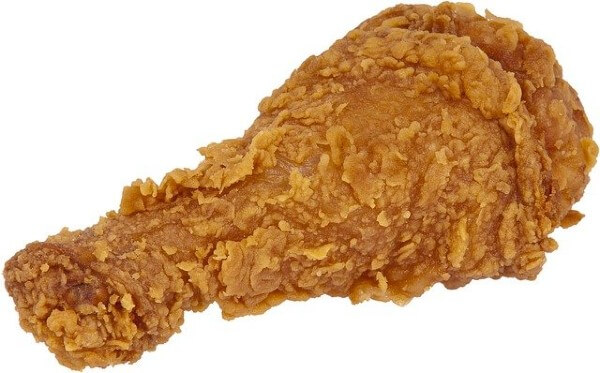
No, dogs should not eat fried Chicken skin. Chicken skin that has been battered with flour and fried in oil will upset your furry friend’s stomach.
Most fried Chicken skin has been battered with all-purpose flour. When fried in oil, this type of flour helps give that golden-brown coating color. All-purpose flour is not good for canine health. The best type of flour for our pooch is whole wheat flour.
In addition, fried food is considered unhealthy even for humans so it is definitely dangerous to our pups. Their stomach may have a hard time digesting the fried food this will affect not only their small intestines but also their physical and mental health.
Helpful Hint: Here’s the key to a well-balanced healthy diet for dogs: Avoid food like Hash browns that are fried in oil and contain tons of fats, salt, and preservatives.
Calories in Chicken skin
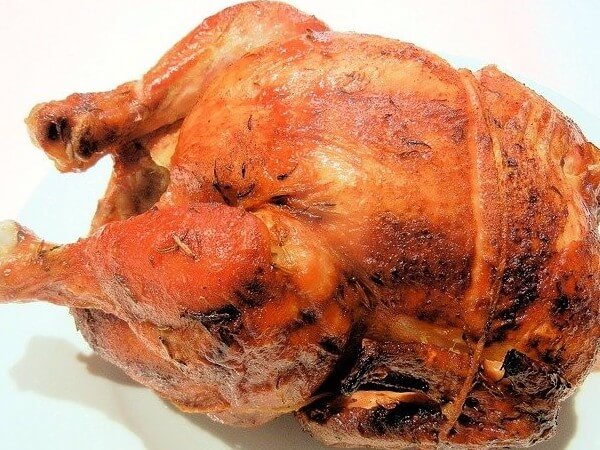
Chicken skin is also high in calories. Let’s dive deeper and compare the daily calorie intake between a large dog and a small dog when eating fried, cooked, and raw Chicken skin.
Since I have two dogs, a Chihuahua and a yellow Labrador, I decided to do the math (so you don’t have to), and here is what I found out:
Plain chicken meat is one of the best protein options for our canines. Without the skin, the plain chicken meat is only 284 calories. It gives your pooch only 20% fat with a majority of 80% protein.
If you allow your pooch to eat the chicken meat with the skin, the following happens:
- Percentage between fat and protein changes
- Total calories increase to 384 from 284 (Chicken skin and chicken meat)
- Total fats increases (Chicken skin and chicken meat)
Keep in mind that a dog should consume just 25 calories for each pound they weigh daily. This means:
- A 10-pound Chihuahua should eat no more than 250 pounds per day.
- A 70-pound Labrador should eat no more than 1,750 pounds per day.
Now, let’s take a look at the calories in Chicken skin:
- 70g of raw Chicken skin (244 calories): 98% Chihuahua / 14% Labrador daily intake
- 70g of roasted Chicken skin (317 calories): 127% Chihuahua / 18% Labrador daily intake
- 70g of fried Chicken skin (351 calories): 140% Chihuahua / 20% Labrador daily intake
From these calculations, it’s easy to see that a 70g portion of Chicken skin accounts for a large portion of a small dog’s daily intake. In fact, the calories in roasted Chicken skin and fried Chicken skin are above and beyond what a small dog like a Chihuahua should have daily.
This means regularly feeding your small dog Chicken skin, whether it is raw, roasted, or fried could negatively affect their health. As mentioned above, fried Chicken skin can get stuck in their small intestines or cause constipation.
Dogs can also become overweight and their excessive weight could put pressure on their joints and bones, which could lead to a ton of other health problems.
Keep in mind that Chicken skin does not provide any nutritional benefits so your smaller dogs would be packing on extra weight without receiving any nutrients.
With that said, it’s best to only feed Chicken skin to your pups in moderation. Regularly feeding on Chicken skin is not a good idea.
Fun Fact: Before you let your canine friends eat those Chicken nuggets from your plate, it’s important to know what is in them. Check the ingredients as some of the ingredients can lead to serious health issues.
What if my dog accidentally ate a lot of Chicken skin?
Dogs that eat only a little bit of Chicken skin should be fine. If your four-legged friends accidentally eat a lot of Chicken skin, monitor their behaviors closely and see if there’re any bad reactions.
Here’s what you can expect in the short term:
- Vomiting.
- Diarrhea.
- Loose stool.
- Constipation.
- Excessive thirst.
If your furry friends do vomit, ask your vet if it’s a good idea to feed them rice and boiled chicken. These two foods won’t agitate the digestive system and will settle down in their stomachs. Your vet may also recommend feeding your canine friends homemade chicken noodle soup so they feel better again.
Dogs that do not show any reactions can still be affected. In fact, some health problems related to eating Chicken skin can show much later such that they may gain weight or develop pancreatitis.
If you suspect your furry friends may have health issues, consult with your vet right away. Like my friend’s vet, they may ask you to come in if they think it is serious or ask that you monitor your pooch for the next 24 hours.
We recommend taking the necessary precautions early rather than later. Waiting can cause delay and it may be a bit too late to treat the health problems then.
What are some dog-friendly and safe non-toxic alternatives to Chicken skin?
Most dogs love the smell and taste of Chicken. I haven’t met a dog who doesn’t. As soon as I bring Chicken home, my two pups know right away and will follow me around until they have a bit of that Chicken meat.
Instead of giving them Chicken skin (after my vet’s advice), I just feed both of them the meat portion instead. Coming from a big family, the Chicken is usually devoured within 20 minutes. If this is the case, I give my two furry friends these dog treats and they go crazy for these:
When choosing the best dog treats for your furry friends, we recommend selecting treats that are natural and organic. There should be no preservative, artificial flavors, or added salt. When it comes to chicken dog treats, choose the chicken breast meat.
So, can dogs eat Chicken skin?
It’s best to avoid feeding your dog Chicken skin. Instead, it is safer to give them plain chicken meat that does not contain any seasoning or added flavor. Plain chicken meat is highly recommended.
Always feed your pooch with their health in mind and take into consideration the 90/10 rule when it comes to their diet.
Related Questions
While dogs can eat cooked Chicken skin, it’s best to avoid feeding them the cooked Chicken skin due to the high fats and oil content in it.
If you must, you can feed your canine companions cooked Chicken skin as part of their balanced diet and in moderation to avoid health issues like weight gain.
While dogs can eat boiled Chicken skin, make sure there are no added seasonings like salt, pepper, or garlic. Garlic is extremely dangerous to dogs. Additionally, it’s best to avoid feeding them Chicken skin since it is high in fat and calories.
Chicken skin also does not provide any nutritional benefits so it’s best to give your pooch his regular dog food.
No, dogs should not eat KFC Chicken skin. The Chicken skin at KFC is battered with all-purpose flour and fried in oil that is not safe for dogs. Additionally, the oil that is used to fry the Chicken is used multiple times throughout the day. We would not recommend feeding your furry friends KFC Chicken skin.
While dogs can eat roast Chicken skin, it’s best that they ingest it in moderation and as part of their balanced diet. Again, check to make sure there are no added seasonings like vinegar, salt, pepper, or garlic. Garlic is toxic to dogs.
The roasted Chicken skin has a high fat content and is loaded with calories. It also does not give your pooch any nutritional benefits.
Instead, there are many dog-friendly foods that are healthy for dogs and also provide nutrients to dogs so it’s best to stick with those.
While dogs can eat the skin of rotisserie chicken, it doesn’t mean that they should. The skin of the rotisserie chicken is packed with calories and fats. Eating it on a regular basis can lead to weight gain and other health issues. There’s also no nutritional benefit of eating rotisserie Chicken skin.
Be sure that your pooch eats it in moderation. Before you hand over the skin of the rotisserie chicken, check that it is plain with no seasonings like pepper, salt, garlic or vinegar. Garlic is not good for dogs and too much salt can cause sodium poisoning.
Choose canine-friendly food instead that’s packed with nutrients and minerals so your pooch can stay healthy, active, and strong.
DISCLAIMER: THIS WEBSITE DOES NOT PROVIDE MEDICAL ADVICE
The information, including but not limited to, text, graphics, images and other material contained on this website are for informational purposes only. No material on this site is intended to be a substitute for professional veterinary advice, diagnosis, or treatment. Always seek the advice of your veterinarian or other qualified health care provider with any questions you may have regarding dietary needs.
Resources:
https://www.nutritionix.com/food/fried-chicken

With over five years of specialized experience as an animal writer, my expertise lies in dog nutrition, health, behavior, grooming, and training. I am dedicated to delivering helpful and informative content that caters to the well-being of our furry friends. My primary goal is to empower pet owners with knowledge and ensure our canine companions thrive in health and happiness. In my free time, I love volunteering at local dog rescue centers.
